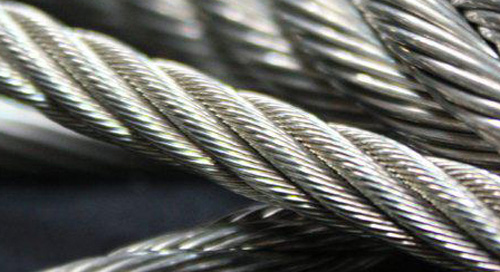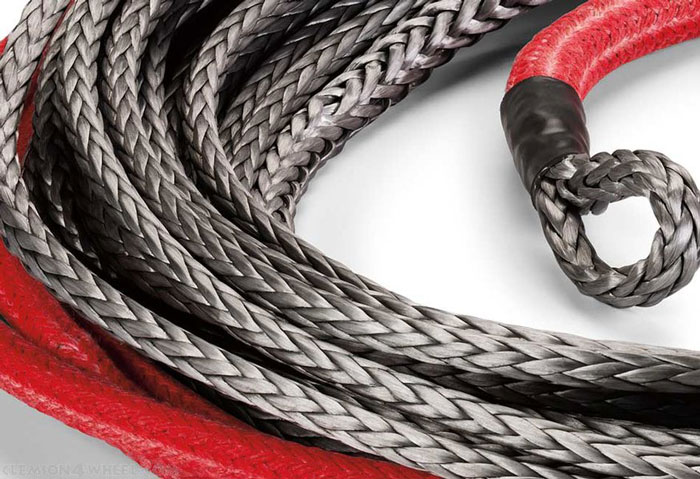Synthetic Winch Rope vs. Steel Cable: The Facts to learn!
by Chris Lewis.
Over the years, the comparison between these two has created a heated debate. Initially, the steel cable had a monopoly in the market. However, it’s glory was dimmed shortly after the invention of the Synthetic Winch Rope in the ’90s.
Most enthusiasts seem to be attracted more towards the synthetic rope than the steel cable. A good reason for that is because the synthetic cord outweighs its counterpart on the pros and has very few shortcomings.
Others hold their preference argument on the fact that the choice between a synthetic cable and steel rope relies on the purpose you intend to undertake. To settle the score between the two, how about we dive right into their detailed description.
Synthetic Winch rope vs. Steel cable
Steel Cable

When it comes to durability, the steel cable carries the day. The cable is less prone to wearing out and abrading over time. Therefore, you are guaranteed more extended service and, to a great extent, reduced maintenance.
As far as maintenance is concerned, you’ll only need to coat the steel cable with WD-40 to prevent rusting. The coating process for the steel wire happens once or twice a year. The steel cable is not much of an attention seeker when it comes to maintenance as compared to the synthetic rope.
Great as it is in serving its purpose, it tags along with several drawbacks. Once the steel cable begins to wear out, it develops burrs. The burrs are a safety concern as they can cause injuries to the hands.
Therefore, if the cable starts wearing out, you should wear gloves before handling it. Additionally, the steel cable is prone to rust. When the burrs get subjected to rusting, and they accidentally happen to rupture the handler’s hands, it can cause infections.
The steel cable is capable of storing a lot of energy when in use. It can expose the controllers to risks of injury in case it breaks off.
Once that happens, the cable snaps back aggressively and can cause severe abrasions on someone. In extreme cases, it can kill you if the cable comes into contact with your body. As far as safety is concerned, the steel cable is not the right way to go.
In comparison to the synthetic rope, the wire is much more substantial. It adds unnecessary bulk when it comes to carrying it around and also in executing plowing procedures. On top of that, as a result of its substantial characteristic, it may require a lot more workforce to handle it as compared to the synthetic rope.
In case the steel cable breaks off, it will be close to impossible to carry out a temporary fix. You will result in replacing it with a new one immediately. In contrast to the synthetic rope, where once it breaks off, fixing it back won’t be much of a struggle.
If not correctly handled, the steel cable develops kinks. Kinks are a headache when it comes to spooling your steel cable on the drum. The curves also bring about a high risk of spurring or breaking off in the kinked up regions. The curls may alternatively shorten and disfigure the original state of steel cable, and this will downgrade its service quality.
Highlighted features:
- Heavyweight
- Stores tremendous energy
- Durable
Synthetic Winch Rope

The synthetic winch rope has its roots from polythene material. The polythene material makes it approximately 80% lighter than the steel cable. That is a lot of weight relief compared to a steel cable. It makes it very easy to carry around and requires less workforce to handle it.
When it comes to safety, this is where the synthetic rope holds more bragging grounds than the steel cable. The synthetic cord does not store energy, so in the case where it breaks off, it won’t be fatal or cause injuries of any kind. Unlike the steel cable, it does not snap back, but instead, it falls off to the ground.
The synthetic rope is very flexible. The flexibility of the cord makes it resistant to kinks, unlike the steel cable. Therefore, deformity in shape will be hard to come by. More so, if the rope happens to break while spooling, it can be easily repaired using the right weaving procedures.
As much as the synthetic rope seems to be the better option, it has its limitations too. One major con of the synthetic rope is high maintenance. Contrary to the steel cable, the synthetic rope needs constant maintenance.
When used in muddy situations, dirt gets into the rope and weaken the rope from inside out. It makes the rope very vulnerable to breaking down.
Therefore, after plowing, you’ll need to unwrap the rope and wash off the dirt that gets trapped in between it, and leave it to dry, and then weave it back. Carrying out this process is time-consuming and tiring all the same.
The rope is also susceptible to UV rays and chemicals. Exposure to such weakens it and diminishes its durability. Likewise, water holds the same effect on the synthetic rope, especially in cold weather.
Once the water freezes in between the threads, the cord becomes one film string of ice. When that happens, you can forget the flexibility of the synthetic line. The cord is more likely to break off within one single stretch out.
Highlighted qualities
- Lightweight
- Rust-free
- Stores less energy
- Flexible
Verdict

The synthetic rope and the steel cable aim at providing you with the best plowing service. But when it comes to settling for the best, the synthetic winch rope is by far the ideal pick.
Safety comes first before anything. You don’t want to gamble your well-being in the field of work. With the synthetic rope, chances of you getting injuries are close to zero.
Additionally, the synthetic line appears to be an upgrade of the steel rope. By looking at factors such as flexibility and weight, the synthetic rope to make your work easier and high yielding at the same time. It is arguably the best call if you settled for synthetic winch rope to the steel cable for plowing your fields.
 |
 |
 |
 |

About Chris Lewis.
Chris Lewis is a passionate individual with a deep affinity for the world of automobiles. From a tender age, his fascination with cars was nurtured by his father, a seasoned mechanic based in the vibrant city of San Francisco. Growing up under the watchful guidance of his skilled father, Chris developed an early aptitude for all things automotive.
Thoughts on "Synthetic Winch Rope vs. Steel Cable: The Facts to learn!"
 |
 |
 |
 |
Check These Out
Get FREE Filters now. Or latest free tools from our best collections.
Disable Ad block to get all the secrets. Once done, hit any button below
 |
 |
 |
 |